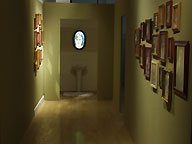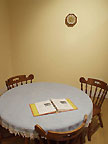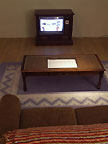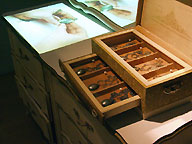|
|
||
| Home I Art Call I Current Exhibit I Archives I Featured Artists I About Us I Contact | ||
|
Barbara Smith MFA Barbara Smith works in both
an autobiographical and a narrative form, drawing intensely on personal
experiences which are told and retold, playing with the relationship
between the personal and tragic and the real and emotive. This retelling
encompasses both a multimedia and tactile intimacy with an emphasis on the
ideas of storytelling and collection. She creates a distinctly unique
narrative by weaving together easily recognizable texts with her own
voice. Barbara tells these multilayered stories through the collecting of
nostalgic objects and an examination of the significance of family
imagery, finding a sense of self that was formed by both personal and
collective experiences. The fabricated and found objects and imagery
become indistinguishable. In places, her hand's work becomes less apparent
because those experiencing her art are struck by these relics in a way
that causes recognition. Barbara Smith obtained her B.A. in 2003,
graduating with distinction in both Art Education and Fine Arts at Purdue
University, while also studying at the University of Colorado in Colorado
Springs. Barbara obtained her Master of Arts in Photography and Related
Media with an emphasis in Metalsmithing at Purdue University in 2005. Artistís statement The house is an exterior, a shell, like the skin on our bodies. Through its occupants, it lives and dies. The childhood home, so like a womb, protects its inhabitants from the outside world. It is here that one must go when the self has been lost, when one is left with nothing but a sense of estrangement before their own image in the mirror. Back to the beginning, back to the point of definition. This environment allows a reconstruction of identity and a dialogue with objects and spaces that carry an immutable sense of the past and at the same time have multiple meanings. Various narratives intersect like stories between photographs in a family album. Souvenirs from a time past are hidden and displayed, showcased and misplaced. These iconographic objects beckon deliberation, self-correction, and self-adjustment. Each narrates layers of memories referencing the space of initial interaction. History becomes personal, souvenirs of life become relics. They certify the presence of the past, in space and time, while creating a venue for a reworking process of unconscious optics. These fragments are now assembled under a new law, where precedents and parallels incite recovery and rediscovery. Multiple narratives speak at once; childhood memory is altered when recalled as an adult. These familiar objects are passed on, with memories attached, only to have new layers added. Power and knowledge are discovered amidst the struggle of constructing, deconstructing, and reconstructing.
|
|
|




